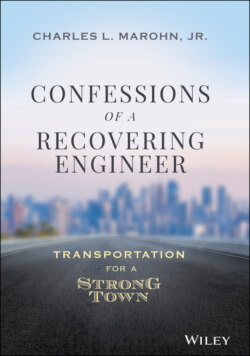Читать книгу Confessions of a Recovering Engineer - Charles L. Marohn Jr. - Страница 11
Biased Language
ОглавлениеAs an engineer, I have worked on any number of improvement projects. I've improved roads. I've improved streets. I've improved parking lots, frontage roads, and alleys. Like King Midas, everything I and my fellow engineers work on, we seem to improve.
At least that is how we describe what we do. As I write this, my city is seeking bids for what they say in the official notice is a “street improvement project.” It does not seem like an improvement to me, nor to many people who unsuccessfully fought against it, yet formally it is called an improvement.
The project involves the widening of a residential street. The many young families who live there believe that the changes will dramatically increase automobile speeds, which already seem too fast. To widen the street, quite a few mature trees will be removed, and the city has acquired part of the front yards of many of these neighbors, often against their will. To add insult to injury, to help fund the project, these aggrieved property owners are being forced to pay the city a special assessment fee of thousands of dollars. This is the kind of experience that makes my “Conversation with an Engineer” video seem universal.3
What makes this project an improvement? In my eyes, it is a diminishment. Yet, from beginning to end, it has been presented by the city engineer as an improvement project. The subtle bias of this language provides another glimpse at the values embedded within the engineering profession.
From the perspective of the design professional, the current street is “substandard” because, given the design speed the professional has chosen and the number of vehicles they want to accommodate, it does not meet the recipe in the design cookbook. The way to “fix” the “substandard” street is to “improve” it to be consistent with the recipe.
This is merely a reinforcement of the underlying values already discussed, but in a way that manipulates the conversation in favor of the engineer's perspective. Who would want something to be substandard? Who could possibly be against improving things? Yet, obviously, whether a project makes things better depends entirely on a person's perspective.
Instead of a “street improvement project,” why not just call it a “street project.” Or, if we need an adjective, how about a “street modification project.” If the profession is free of values, as its practitioners claim, such a change in language should not be the least bit threatening.
The same goes for the word “enhancement.” For example, when we “enhance the clear zone,” what we really mean is that we are removing all of the trees within a certain distance of the roadway edge. This may indeed be an enhancement to the person wanting to drive quickly through that area, but it may also be a huge diminishment for the person who uses those trees as a sound and visual buffer between their home and the traffic. Why don't we just say, “remove the trees”?
I think the reason is abundantly clear. For the design professional with speed of travel as the highest value, removing the trees from alongside the road is an enhancement. It allows traffic to move at higher speeds. In the eyes of the traffic engineer, “remove the trees” focuses on a negative, and “enhance the clear zone” focuses on a positive, all while being an equally valid yet still value-free, description.
Even deeply technical terms like “Level of Service” are projections of the underlying value system. When evaluating the performance of a street using Level of Service, the traffic engineer will consider how well things are operating from the perspective of the driver. The street is then given a grade, like an academic course, with A being the best and F signifying failure. Level of Service A means that traffic flows freely with no hindrance, while Level of Service F merely means that travel time for the driver is not predictable.
Never mind that Level of Service A is often horrific for people trying to cross a street on foot. And never mind that a high level of service generally means a lower level of financial productivity for the community (higher costs, lower financial return), especially on local streets.4 For the engineer who values traffic speed above all else, there is no conflict in using this grading system to prioritize “improvements.”
When engineers do not recognize their own values and how they are being projected in the words they use, we must do that for them by correcting their language to remove the bias.
